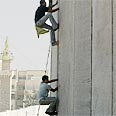
For a while it looked as though Amnesty International had lost its sting. The organization, long vocal about the plight of the Palestinians, has been nearly mum about those caught in the cross-fire between terrorists based in their camps and the Lebanese army.
At the start of that conflict, on 23rd May 2007, Amnesty issued a press release laying the responsibility for minimizing civilian Palestinian suffering squarely on the terrorists themselves, which must be a first for the organization. Then on 4th June it voiced "concern" for the "innocent Palestinians who have been killed, injured, displaced and subjected to cruel and inhumane conditions during this conflict."
No outrage, no censure, no condemnation
By contrast, Amnesty International's report last week about Israel's security fence is replete with censure and condemnation.
Few Israelis entertain the fantasy, famously stated in Robert Frost's "Mending Wall," that "good fences make good neighbors." But there is no escaping the cold, hard yet encouraging facts: This much maligned barrier has helped to nearly eradicate terror bombings. It has saved many Israeli lives. Against terrorist neighbors, this benign and highly effective tool works.
So last week's call by Amnesty International to tear down what it calls the "illegal" security fence is a bitter pill for Israelis. It is particularly infuriating for those whose loved ones died because of delays in construction of the fence.
My daughter Malki's murderer, a Hamas operative, slipped easily into Jerusalem's city center from his home in Nablus because, in August 2001, the number of terror-victims had not yet convinced the Israeli government that a security fence needed to be a top priority.
Other countries have recognized the merits of security barriers. In a recent essay, A World Divided, TIME magazine listed numerous countries throughout the world that have erected barriers, are in the process of constructing or are planning them. These include: Pakistan, India, Iran, Botswana, Saudi Arabia, Thailand, and the United States.
Still, TIME's essayist Simon Robinson found it necessary to zero in on - you guessed it - only Israel. He concedes that "The slab surrounding the West Bank has dramatically reduced the number of suicide bombings inside Israel." But then Robinson seeks out an Israeli who is committed to the fence's dismantlement. Quoting the critic, Danny Seidmann, he writes: "Physical barriers are a legitimate, limited tactical response to terrorism but they're ultimately counterproductive". He warns that a wall reflects badly on its builder... (it) is a physical manifestation of failed policies." Seidmann and Robinson worry that a wall "says a lot more about the people who built it than those it's keeping out."
Abandoning impartiality
They are so right. Building a fence is the least invasive anti-terrorist tactic. There is no more considerate way to handle blood-thirsty neighbors like Hamas, Islamic Jihad, al-Aqsa Martyrs Brigade and other Palestinian terror organizations. The fact that Israelis have opted for that tactic does indeed say a lot about them. In a saner world, this would be taken as an accurate sign that Israelis crave peace and want nothing more than to go about their daily routines without fear and without fighting.
Amnesty long ago provided ample evidence that it abandoned impartiality. Aside from its indifference to ruthless, genocidal regimes like Sudan's, Amnesty's latest statement about the anti-terror fence exhibits callous indifference to the loss of Israeli lives. It complains that "Israel's legitimate security concerns are no excuse" for building the fence. Those "legitimate security concerns" are, plainly, the desire to save innocent Israeli lives.
My bet is that if the lives at stake were the loved ones of Amnesty's management team, they would build a fence with their own bare hands. What I doubt is that they would deal with complaints against their fence with the thoroughness and transparency that Israel has exhibited.
In a recent article in FrontPageMag, Joseph Klein reports that some 140 Palestinian legal actions against the route have been reviewed by Israel's high Court, resulting in several orders of re-routing, and of compensation totaling nearly $1.5 million.
Israel must not allow Amnesty International's biased meddling to distract it from a long overdue task: completion of the remaining 130 miles of security fence. And while it is at it, the government could launch a public relations campaign to counter the lies that our enemies have actively disseminated about it. For example, it is not a wall or a "slab" but simply a fence for 95% of its length.
The fence may be benign, but Amnesty's activities are not.
Frimet Roth is a freelance writer based in Jerusalem who frequently contributes articles dealing with terrorism and with issues connected with special-needs children. She and her husband founded and run (as unpaid volunteers) the Malki Foundation ( www.kerenmalki.org) in memory of their daughter who was murdered at the age of 15 in a terror attack on a Jerusalem restaurant in 2001. The foundation provides concrete support for Israeli families of all religions who care at home for a special-needs child. She can be reached at frimet.roth@gmail.com















